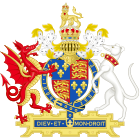Appointment of Bishops Act 1533 facts for kids

|
|
| Long title | An Acte restraynyng the payment of Annates, &c. |
|---|---|
| Citation | 25 Hen. 8. c. 20 |
|
Status: Amended
|
|
| Revised text of statute as amended | |
The Appointment of Bishops Act 1533 was a very important law in England. It is also known by a longer name: the Act Concerning Ecclesiastical Appointments and Absolute Restraint of Annates. This Act changed how church leaders, especially bishops, were chosen. It also stopped certain payments from England to the Pope in Rome.
This law was passed by the Parliament of England in 1534. It was a key part of the English Reformation. This was a time when King Henry VIII of England wanted more control over the church in his country.
The Act is still partly in force in England and Wales today.
Contents
Why Was This Act Needed?
Before this Act, the Pope in Rome had a lot of power over the church in England. One way he had power was through payments called annates. These were payments made by new bishops to the Pope.
King Henry VIII wanted to reduce the Pope's influence. His chief minister, Thomas Cromwell, also wanted to stop these payments. They wanted the money to stay in England and go to the King instead. This would help the King's finances and strengthen his power.
Around 1533, the King's government started planning new laws. One idea was to stop all payments to the Pope. This included annates and other fees like "Peter's Pence." The plan was that if the Pope tried to cause trouble for the King, these payments would go to the King instead. This money would help protect the King and England.
The Bill's Journey Through Parliament
A bill about annates was first introduced in the House of Commons of England. It seemed to pass easily there. This might have been because of Thomas Cromwell's influence.
However, the bill faced problems in the House of Lords. The Lords Spiritual, who were church leaders, had complained about annates before. They felt these payments made them poor. Historians think they probably didn't want the King to keep these payments either. So, the first version of the bill was dropped.
A new bill was introduced in the House of Lords on February 27. It passed there on March 9. The House of Commons approved it a week later. This new Act finally ended all annates payments to the Pope. Interestingly, the Act did not say the payments should go to the King. This was a small victory for the church leaders.
How Bishops Were Chosen
The other main part of the Act changed how bishops were elected. Before this law, the local church leaders (the dean and chapter of a cathedral) would elect a new bishop. They usually chose the person the King wanted.
This Act made the King's choice a legal requirement. The King would send a "letter missive" naming his chosen candidate. The church leaders then had to elect that person.
If the church leaders did not elect the King's choice, they would face a serious punishment. This punishment was called praemunire. It meant they could lose their property and even be imprisoned. This part of the Act made sure the King had full legal control over choosing bishops.
Later Changes to the Act
Over the years, some parts of this Act have been changed or removed.
For example, a law from 1969, the Statute Law (Repeals) Act 1969, removed some older sections. However, it did not stop the main parts of the Appointment of Bishops Act 1533 from working.
More recently, the Cathedrals Measure 1999 made another change. It said that the "College of Canons" must now do the jobs that the "dean and chapter" used to do. This means the College of Canons now follows the Act when choosing bishops. This applies to almost all cathedrals in England.
 | Georgia Louise Harris Brown |
 | Julian Abele |
 | Norma Merrick Sklarek |
 | William Sidney Pittman |

